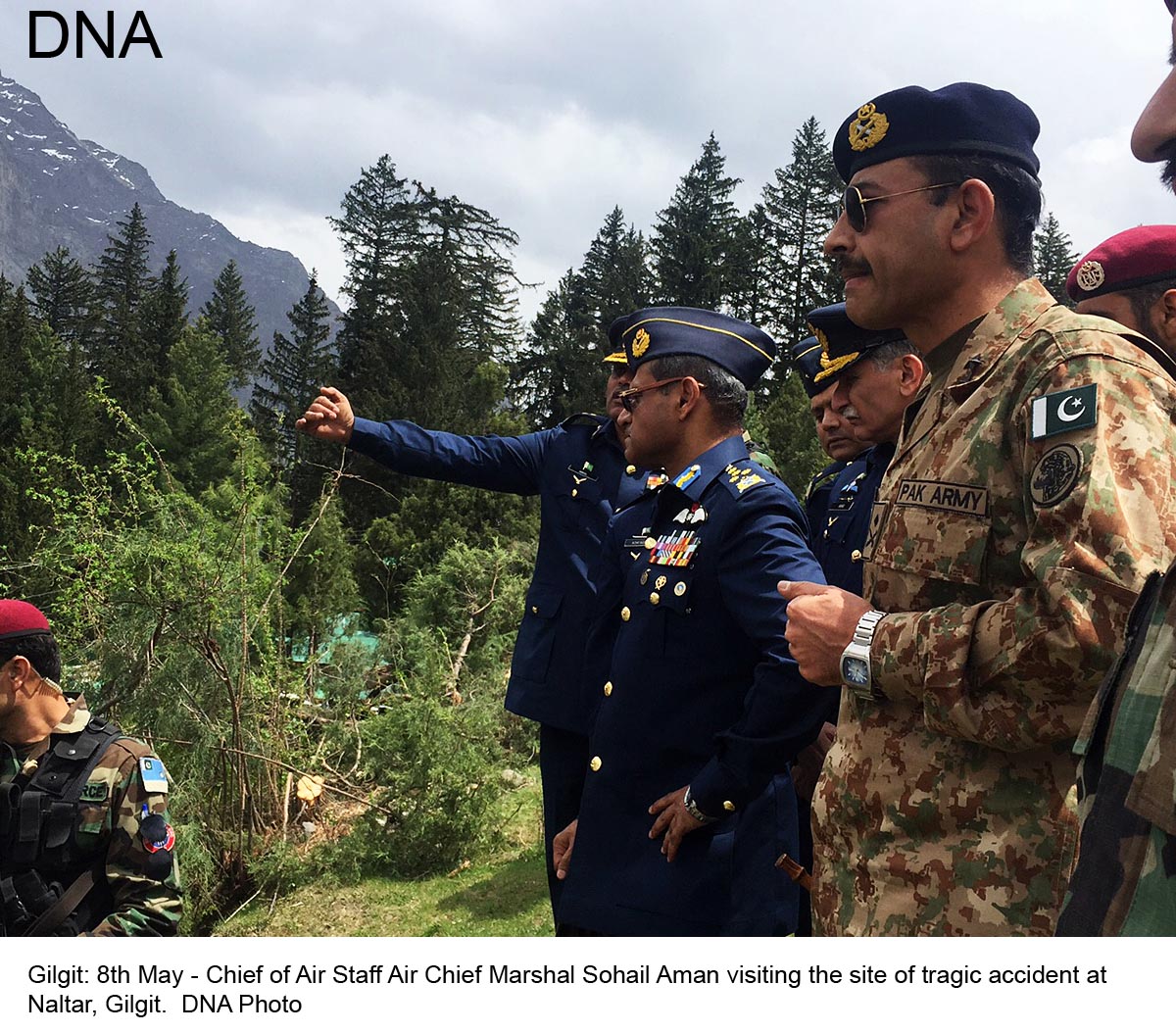EDITORIAL: The Naltar Helicopter crash: some musings

ANSAR MAHMOOD BHATTI
The Naltar helicopter crash on May 08, 2015, ostensibly jolted the entire diplomatic community in particular and common Pakistanis in general as eight precious lives were lost. Ambassadors of Norway, the Philippines and Indonesia and wives of Indonesian and Malaysian ambassadors lost their lives in this deadly crash. Both pilots of Pakistan Air Force also embraced martyrdom. Though one cannot do anything to avoid such calamities, yet certain pre-cautionary measures can surely contribute towards limiting risks to human lives.
The Gilgit area is dangerous and difficult in the sense that most of its valleys are located in between narrow ridges and mountains. Therefore a little bit of fumble on the part of the pilots or any technical discrepancy in the machine can prove fatal. As reports and eye-witnesses suggest, a technical fault led to the MI 17 helicopter crash. The helicopter developed that fault when it was about to land — perhaps 20 to 25 meters away from the landing point, and that is why rest of the passengers remained safe or got minor injuries. Ambassadors of the Netherlands, Malaysia and Poland received injuries who are now under treatment in their respective countries.
Ambassador of Romania Emilian ION who miraculously escaped unhurt in this fatal accident told Centreline that God has given him a new life. He also owes a great deal to pilots whose professionalism minimised impact of the accident. Ambassador of Tajikistan Sherali Jononov, who saw all this happening from his helicopter, expressed similar views especially about the job done by the pilots.
All said and done, one cannot support the idea of taking so many ambassadors to a place that is well known for disturbances. And more importantly to include non-diplomats in the group was yet another mistake as the diplomats were exposed to greater threat because of this action. It is still a mystery as what was the urgency and compulsion to include these “semi-journalists” in the trip, which was purely designed for diplomats and their families.
International Cricket Returns to Pakistan
The visit of Zimbabwe cricket team unquestionably seeks to not only set strong basis for revival of international cricket in Pakistan, but it would surely contribute towards improving Pakistan’s credentials as a safe country. Undoubtedly, a lot more is still to be done when it comes to improvement of the security situation in the country, nevertheless this visit would certainly help achieve that end. International teams stopped coming to Pakistan after the 2009 terrorist attack on the Sri Lankan cricket team. It was of course a plot conceived by our enemies so as to isolate it in the comity of nations – and to a great extent the hatchers of the plot did succeed in their nefarious motives. However, after concerted efforts of especially the Pakistan Cricket Board (PCB) the dream of revival of international cricket has finally come true.
Hats therefore off to the Zimbabwe cricket team and its management and particularly the Zimbabwe government that took this bold and brave decision to send their team to Pakistan despite certain security issues. The Pakistan officials on their part tried their utmost to provide fool-proof security to the visiting team yet there is definite room for improvement and more efforts will be needed in future for visits by high-ranked teams. Zimbabwe are considered cricket-minnows and may not have the same importance and value as compared with Australia, South Africa, India, England or New Zealand but for us they are like heroes and they rightly got a hero’s welcome in Pakistan.
Now when the international cricket stands revived in Pakistan the next moot point that our leaders and PCB officials ought to be worried about is that how to keep up this momentum in future. One way of doing this is to focus on improving the law and order situation to the extent that teams are ready to come here at any time. Political will is indeed needed and greater onus lies on the political leadership to come up with concrete visionary steps that ultimately lead to amelioration of security situation in Pakistan.
Related News

Israel’s Failure to Defeat Hamas: A Strategic Paradox
By Qamar Bashir On October 7, 2023, I warned in my first article that theRead More

Karachi Tragedy—a reflection of national apathy
Opinion Ansar Mahmood Bhatti On July 4, 2025, another tragedy has Karachi—a city that neverRead More


Comments are Closed